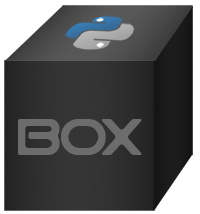from box import Box
movie_box = Box({ "Robin Hood: Men in Tights": { "imdb stars": 6.7, "length": 104 } })
movie_box.Robin_Hood_Men_in_Tights.imdb_stars
# 6.7Box will automatically make otherwise inaccessible keys safe to access as an attribute. You can always pass conversion_box=False to Box to disable that behavior. Also, all new dict and lists added to a Box or BoxList object are converted automatically.
There are over a half dozen ways to customize your Box and make it work for you.
Check out the new Box github wiki for more details and examples!
Version Pin Your Box!
If you aren't in the habit of version pinning your libraries, it will eventually bite you. Box has a list of breaking change between major versions you should always check out before updating.
python-box[all]~=7.0
As Box adheres to semantic versioning (aka API changes will only occur on between major version), it is best to use Compatible release matching using the ~= clause.
python -m pip install --upgrade pip
pip install python-box[all]~=7.0 --upgradeBox does not install external dependencies such as yaml and toml writers. Instead you can specify which you want, for example, [all] is shorthand for:
pip install python-box[ruamel.yaml,tomli_w,msgpack]~=7.0 --upgradeBut you can also sub out ruamel.yaml for PyYAML.
Check out more details on installation details.
Box 7 is tested on python 3.7+, if you are upgrading from previous versions, please look through any breaking changes and new features.
Box has introduced Cython optimizations for major platforms by default. Loading large data sets can be up to 10x faster!
If you are not on a x86_64 supported system you will need to do some extra work to install the optimized version. There will be an warning of "WARNING: Cython not installed, could not optimize box" during install. You will need python development files, system compiler, and the python packages Cython and wheel.
Linux Example:
First make sure you have python development files installed (python3-dev or python3-devel in most repos). You will then need Cython and wheel installed and then install (or re-install with --force) python-box.
pip install Cython wheel
pip install python-box[all]~=7.0 --upgrade --forceIf you have any issues please open a github issue with the error you are experiencing!
Box is designed to be a near transparent drop in replacements for dictionaries that add dot notation access and other powerful feature.
There are a lot of types of boxes to customize it for your needs, as well as handy converters!
Keep in mind any sub dictionaries or ones set after initiation will be automatically converted to a Box object, and lists will be converted to BoxList, all other objects stay intact.
Check out the Quick Start for more in depth details.
Box can be instantiated the same ways as dict.
Box({'data': 2, 'count': 5})
Box(data=2, count=5)
Box({'data': 2, 'count': 1}, count=5)
Box([('data', 2), ('count', 5)])
# All will create
# <Box: {'data': 2, 'count': 5}>Box is a subclass of dict which overrides some base functionality to make sure everything stored in the dict can be accessed as an attribute or key value.
small_box = Box({'data': 2, 'count': 5})
small_box.data == small_box['data'] == getattr(small_box, 'data')All dicts (and lists) added to a Box will be converted on insertion to a Box (or BoxList), allowing for recursive dot notation access.
Box also includes helper functions to transform it back into a dict, as well as into JSON, YAML, TOML, or msgpack strings or files.
A huge thank you to everyone that has given features and feedback over the years to Box! Check out everyone that has contributed.
A big thanks to Python Software Foundation, and PSF-Trademarks Committee, for official approval to use the Python logo on the Box logo!
Also special shout-out to PythonBytes, who featured Box on their podcast.
MIT License, Copyright (c) 2017-2023 Chris Griffith. See LICENSE file.

